Deciphering the Landscape of Kitchen Remodel Costs
Introduction:
Embarking on a kitchen remodel journey is an exciting yet daunting task. One of the critical factors to consider is understanding the average costs associated with such a project. As we navigate through 2021, let’s delve into the intricacies of kitchen remodel expenses and what to expect.
Setting Expectations:
Before diving into the specifics, it’s essential to set realistic expectations regarding the costs involved in a kitchen remodel. The average price range varies significantly based on factors such as the scope of the project, the quality of materials, and your location. Keeping these variables in mind will help you approach your remodel with clarity.
Breaking Down the Costs:
The cost breakdown of a kitchen remodel typically includes various components, such as materials, labor, permits, and design fees. Understanding each aspect’s contribution to the overall budget is crucial for effective planning and budget management.
Materials Matter:
One of the most significant factors influencing kitchen remodel costs is the choice of materials. From cabinets and countertops to flooring and appliances, the quality and type of materials you select can significantly impact your budget. While options range from budget-friendly to high-end, it’s essential to strike a balance between quality and affordability.
Labor Expenses:
Labor costs constitute a substantial portion of the overall budget for a kitchen remodel. Hiring skilled professionals, such as contractors, carpenters, plumbers, and electricians, is essential for ensuring quality workmanship. Be prepared to allocate a significant portion of your budget towards labor expenses to ensure a successful remodel.
Permit Requirements:
Depending on the scope of your project, you may need to obtain permits from your local municipality. Permit requirements vary by location and the extent of the remodel. Factor in the cost of permits when budgeting for your kitchen renovation to avoid unexpected expenses and delays.
Design Fees:
Engaging the services of a professional designer can streamline the remodeling process and help you achieve your desired aesthetic. Design fees may include consultation, space planning, and concept development. While investing in professional design services can enhance the outcome of your remodel, it’s essential to budget accordingly.
Additional Expenses:
In addition to the primary components of a kitchen remodel, it’s crucial to account for any additional expenses that may arise during the project. Contingency funds for unexpected costs, such as structural repairs or design changes, can provide peace of mind and mitigate financial strain.
Factors Influencing Costs:
Several factors can influence the overall cost of a kitchen remodel, including the size of the space, the complexity of the design, and the extent of structural changes. Additionally, regional differences in labor and material costs can impact the final price tag. Understanding these factors will help you anticipate and plan for potential expenses.
Budgeting Wisely:
Creating a realistic budget is the foundation of a successful kitchen remodel project. Begin by assessing your financial resources and prioritizing your remodeling goals. Researching costs, obtaining multiple quotes from contractors, and diligently tracking expenses throughout the project will help you stay within budget and achieve your desired outcome.
Conclusion:
As you embark on your kitchen remodel journey in 2021, understanding the average costs associated with such a project is essential for effective planning and budget management. By breaking down the various expenses involved, setting realistic expectations, and budgeting wisely, you can navigate the remodel process with confidence and achieve the kitchen of your dreams. Read more about average kitchen remodel cost 2021


